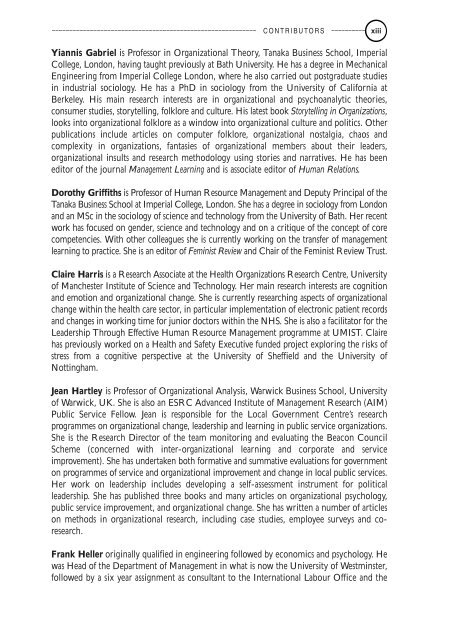essential-guide-to-qualitative-in-organizational-research
essential-guide-to-qualitative-in-organizational-research
essential-guide-to-qualitative-in-organizational-research
- No tags were found...
Create successful ePaper yourself
Turn your PDF publications into a flip-book with our unique Google optimized e-Paper software.
––––––––––––––––––––––––––––––––––––––––––––––––––––––––––– CONTRIBUTORS –––––––––– xiiiYiannis Gabriel is Professor <strong>in</strong> Organizational Theory, Tanaka Bus<strong>in</strong>ess School, ImperialCollege, London, hav<strong>in</strong>g taught previously at Bath University. He has a degree <strong>in</strong> MechanicalEng<strong>in</strong>eer<strong>in</strong>g from Imperial College London, where he also carried out postgraduate studies<strong>in</strong> <strong>in</strong>dustrial sociology. He has a PhD <strong>in</strong> sociology from the University of California atBerkeley. His ma<strong>in</strong> <strong>research</strong> <strong>in</strong>terests are <strong>in</strong> <strong>organizational</strong> and psychoanalytic theories,consumer studies, s<strong>to</strong>rytell<strong>in</strong>g, folklore and culture. His latest book S<strong>to</strong>rytell<strong>in</strong>g <strong>in</strong> Organizations,looks <strong>in</strong><strong>to</strong> <strong>organizational</strong> folklore as a w<strong>in</strong>dow <strong>in</strong><strong>to</strong> <strong>organizational</strong> culture and politics. Otherpublications <strong>in</strong>clude articles on computer folklore, <strong>organizational</strong> nostalgia, chaos andcomplexity <strong>in</strong> organizations, fantasies of <strong>organizational</strong> members about their leaders,<strong>organizational</strong> <strong>in</strong>sults and <strong>research</strong> methodology us<strong>in</strong>g s<strong>to</strong>ries and narratives. He has beenedi<strong>to</strong>r of the journal Management Learn<strong>in</strong>g and is associate edi<strong>to</strong>r of Human Relations.Dorothy Griffiths is Professor of Human Resource Management and Deputy Pr<strong>in</strong>cipal of theTanaka Bus<strong>in</strong>ess School at Imperial College, London. She has a degree <strong>in</strong> sociology from Londonand an MSc <strong>in</strong> the sociology of science and technology from the University of Bath. Her recentwork has focused on gender, science and technology and on a critique of the concept of corecompetencies. With other colleagues she is currently work<strong>in</strong>g on the transfer of managementlearn<strong>in</strong>g <strong>to</strong> practice. She is an edi<strong>to</strong>r of Fem<strong>in</strong>ist Review and Chair of the Fem<strong>in</strong>ist Review Trust.Claire Harris is a Research Associate at the Health Organizations Research Centre, Universityof Manchester Institute of Science and Technology. Her ma<strong>in</strong> <strong>research</strong> <strong>in</strong>terests are cognitionand emotion and <strong>organizational</strong> change. She is currently <strong>research</strong><strong>in</strong>g aspects of <strong>organizational</strong>change with<strong>in</strong> the health care sec<strong>to</strong>r, <strong>in</strong> particular implementation of electronic patient recordsand changes <strong>in</strong> work<strong>in</strong>g time for junior doc<strong>to</strong>rs with<strong>in</strong> the NHS. She is also a facilita<strong>to</strong>r for theLeadership Through Effective Human Resource Management programme at UMIST. Clairehas previously worked on a Health and Safety Executive funded project explor<strong>in</strong>g the risks ofstress from a cognitive perspective at the University of Sheffield and the University ofNott<strong>in</strong>gham.Jean Hartley is Professor of Organizational Analysis, Warwick Bus<strong>in</strong>ess School, Universityof Warwick, UK. She is also an ESRC Advanced Institute of Management Research (AIM)Public Service Fellow. Jean is responsible for the Local Government Centre’s <strong>research</strong>programmes on <strong>organizational</strong> change, leadership and learn<strong>in</strong>g <strong>in</strong> public service organizations.She is the Research Direc<strong>to</strong>r of the team moni<strong>to</strong>r<strong>in</strong>g and evaluat<strong>in</strong>g the Beacon CouncilScheme (concerned with <strong>in</strong>ter-<strong>organizational</strong> learn<strong>in</strong>g and corporate and serviceimprovement). She has undertaken both formative and summative evaluations for governmen<strong>to</strong>n programmes of service and <strong>organizational</strong> improvement and change <strong>in</strong> local public services.Her work on leadership <strong>in</strong>cludes develop<strong>in</strong>g a self-assessment <strong>in</strong>strument for politicalleadership. She has published three books and many articles on <strong>organizational</strong> psychology,public service improvement, and <strong>organizational</strong> change. She has written a number of articleson methods <strong>in</strong> <strong>organizational</strong> <strong>research</strong>, <strong>in</strong>clud<strong>in</strong>g case studies, employee surveys and co<strong>research</strong>.Frank Heller orig<strong>in</strong>ally qualified <strong>in</strong> eng<strong>in</strong>eer<strong>in</strong>g followed by economics and psychology. Hewas Head of the Department of Management <strong>in</strong> what is now the University of Westm<strong>in</strong>ster,followed by a six year assignment as consultant <strong>to</strong> the International Labour Office and the



